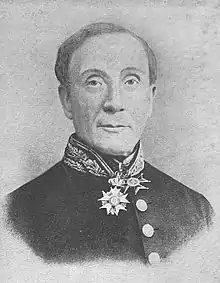Charles-Emmanuel Sédillot
Charles-Emmanuel Sédillot (18 September 1804 – 29 January 1883) was a French military physician and surgeon.[1] He was the son of orientalist Jean Jacques Emmanuel Sédillot (1777–1832), and an older brother to historian Louis-Pierre-Eugène Sédillot.

Charles-Emmanuel Sédillot (1869)
Born in Paris, he studied surgery under Alexis Boyer and Philibert Joseph Roux. In 1836 he became professor of operative surgery at Val-de-Grâce, followed by a professorship at Strasbourg five years later.[2]
Sedillot was a pioneer of urethrotomic and gastrointestinal operations, and known for his work with dislocations and his treatment of pyaemia.[2][3] He is credited with coining the term "microbe" (from micros "small" and bios "life").[4][5]
Selected writings
- Du nerf pneumo-gastrique et de ses fonctions (1829, doctoral thesis) - The pneumogastric nerve and its functions.
- Phlébite traumatique (1832, thesis for agrégation in surgery) Traumatic phlebitis.
- Campagne de Constantine de 1837 - Constantine Campaign (French North Africa).
- De l'opération de l'empyème, (second edition 1841) - Operation for empyema
- De l'infection purulente, ou, Pyoémie, 1849 - Purulent infection or pyemia.
- Traité de médecine opératoire : bandages et appareils (third edition 1865–66) - Treatise on operative medicine : bandages and devices.
- De l'uréthrotomie interne, 1858 - Internal urethrotomy.
- De l'Évidement sous-périosté des os (second edition 1867) - Subperiosteal recess of the bone.[6]
References
- Wright, James R. (2013). "Charles Emmanuel Sédillot and Émile Küss: the first cancer biopsy". International Journal of Surgery (London, England). 11 (1): 106–107. doi:10.1016/j.ijsu.2012.11.017. ISSN 1743-9159. PMID 23220086.
- Google Books System of Surgery by Frederic S. Dennis
- Biographical Dictionary outstanding physicians of the nineteenth century. Berlin, Vienna, 1901, 1567-1569
- Sédillot, C. (1878). "De l'influence des découvertes de M. Pasteur sur les progrès de la chirurgie" [On the influence of the discoveries of Mr. Pasteur on the progress of surgery]. Comptes rendus hebdomadaires des séances de l'Académie des sciences (in French). 86: 634-640. From p. 634: "Les noms de ces organismes sont très-nombreux et devront être définis et, en partie, réformés. Le mot microbe avant l'avantage d'être plus court et d'une signification plus générale, … , nous l'adoptons, … pour la désignation de variétés plus particulièrement étudiées." (The names of these [microscopic] organisms are very numerous and should be defined and, in part, reformed. The word "microbe", having the advantage of being shorter and having a more general meaning, … , we adopt it, … for the designation of more particularly studied varieties.)
- Billmann, Franck (2012). "A pioneer in medicine and surgery: Charles Sédillot (1804–1883)". International Journal of Surgery. 10 (9): 542–546. doi:10.1016/j.ijsu.2012.08.011. PMID 22939975.
- IDREF.fr (bibliography)
External links
- NCBI A pioneer in medicine and surgery: Charles Sédillot (1804-1883).
This article is issued from Wikipedia. The text is licensed under Creative Commons - Attribution - Sharealike. Additional terms may apply for the media files.